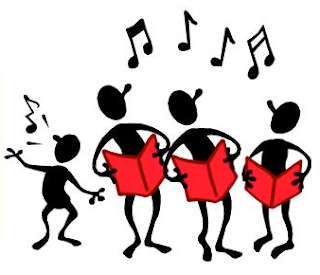TO CHEW ON: "The Spirit of the Lord God is upon me ....
To console those who mourn in Zion
To give them beauty for ashes,
The oil of joy for mourning
The garment of praise for the spirit of heaviness;
That they may be called the trees of righteousness,
The planting of the Lord, that He may be glorified." Isaiah 61:1,3
Praising God is an important and powerful attitude and action. Note some of its occurrences throughout the Bible:
- David appointed a whole section of priests to "minister before the ark of the Lord, to commemorate, to thank, and to praise" - 1 Chronicles 16:4. (One of them—Asaph—is responsible for writing many psalms in the Book of Psalms.)
- Praise brought down the glory of God when Solomon moved the ark from the Tabernacle to the Temple (with a glory-cloud so thick, the priests couldn't do their work or stay inside) 2 Chronicles 5:13,14.
- When the people of Israel began to sing and praise "the Lord set ambushes" against their enemies - 2 Chronicles 20:22.
- The psalm-writers repeatedly encouraged themselves and others to praise God - Psalm 35:28; 51:15; 119:64.
- Praise surrounded the life of Jesus on earth:
- Angels announced His birth with praise - Luke 2:13,14.
- Shepherds returned from seeing Jesus full of praise - Luke 2:20.
- The Father praised Jesus at His baptism - Luke 3:22.
- The crowds praised Jesus when He entered Jerusalem in the manner of a king (Luke 19:37,38).
- The early church and its leaders were characterized by praise - Acts 2:47; 16:25.
In our focus verse, Isaiah calls praise a piece of clothing—a garment. A sidebar article in my Bible explains it well:
"The Hebrew root for "garment" ('atah) shows praise as more than a piece of clothing casually thrown over our shoulders. It literally teaches us "to wrap" or "cover' ourselves—that the garment of praise is to leave no openings through which hostile elements can penetrate. This garment of praise repels and replaces the heavy spirit. This special message of instruction and hope is for those oppressed by fear or doubt. "Put on" this garment. A warm coat from our closet only resists the cold when when it is "put on." When distressed, be dressed—with praise! Act according to God's Word!" - Charles Green, "The Glorious Garment of Praise," New Spirit-Filled Life Bible, p. 946 (emphasis added).
PRAYER: Dear God, how powerful it is to focus on You. Help me to learn the essence of praise—voicing my admiration of You and Your excellencies—not to get something for myself because You are worthy of every compliment. Amen.
MORE: "Yet I Will Praise You" - Vineyard Music














